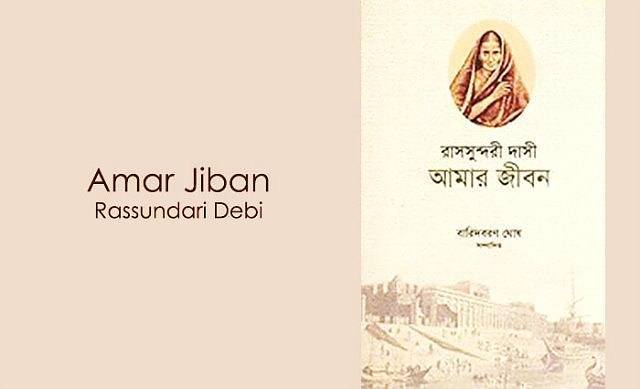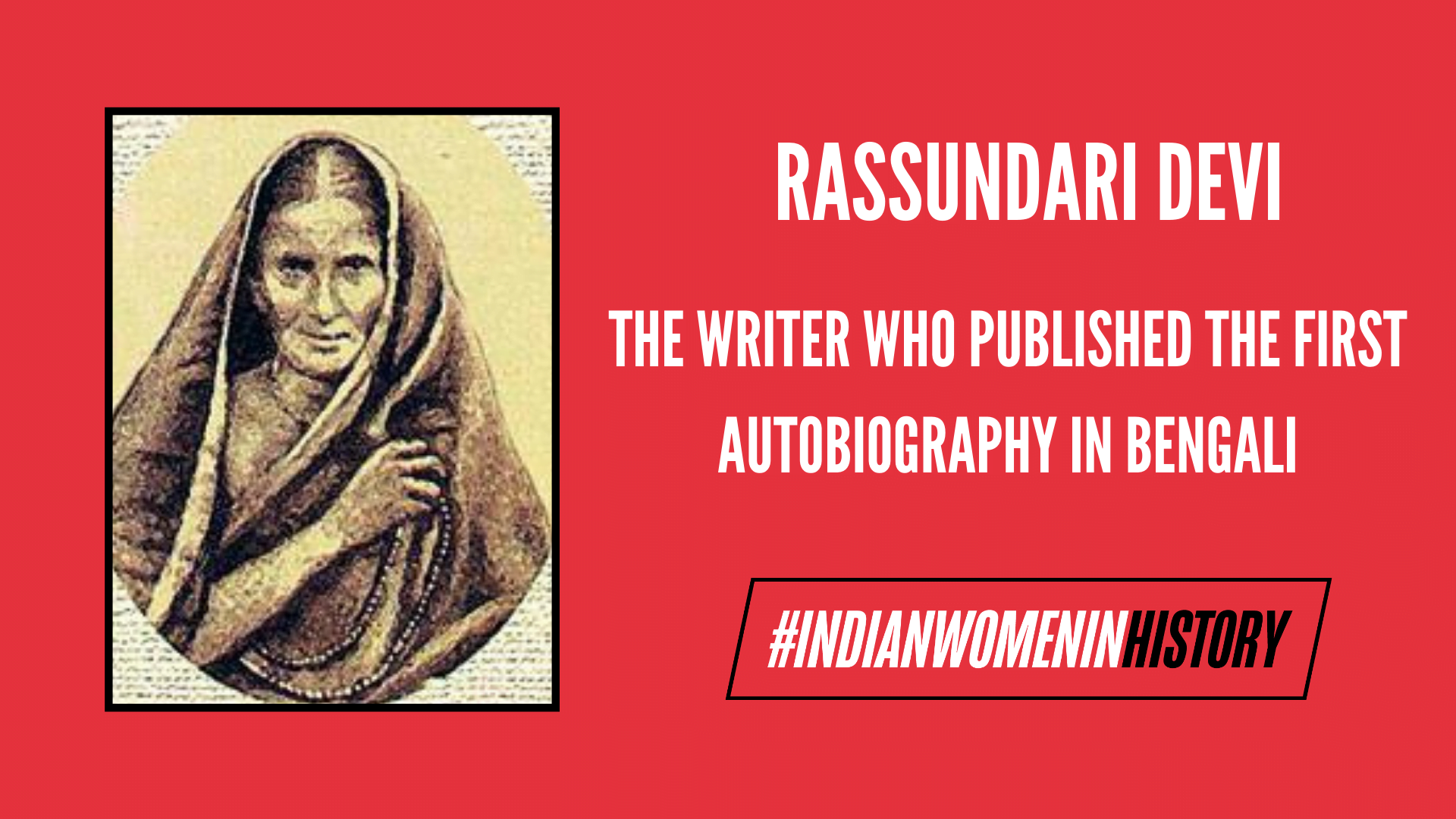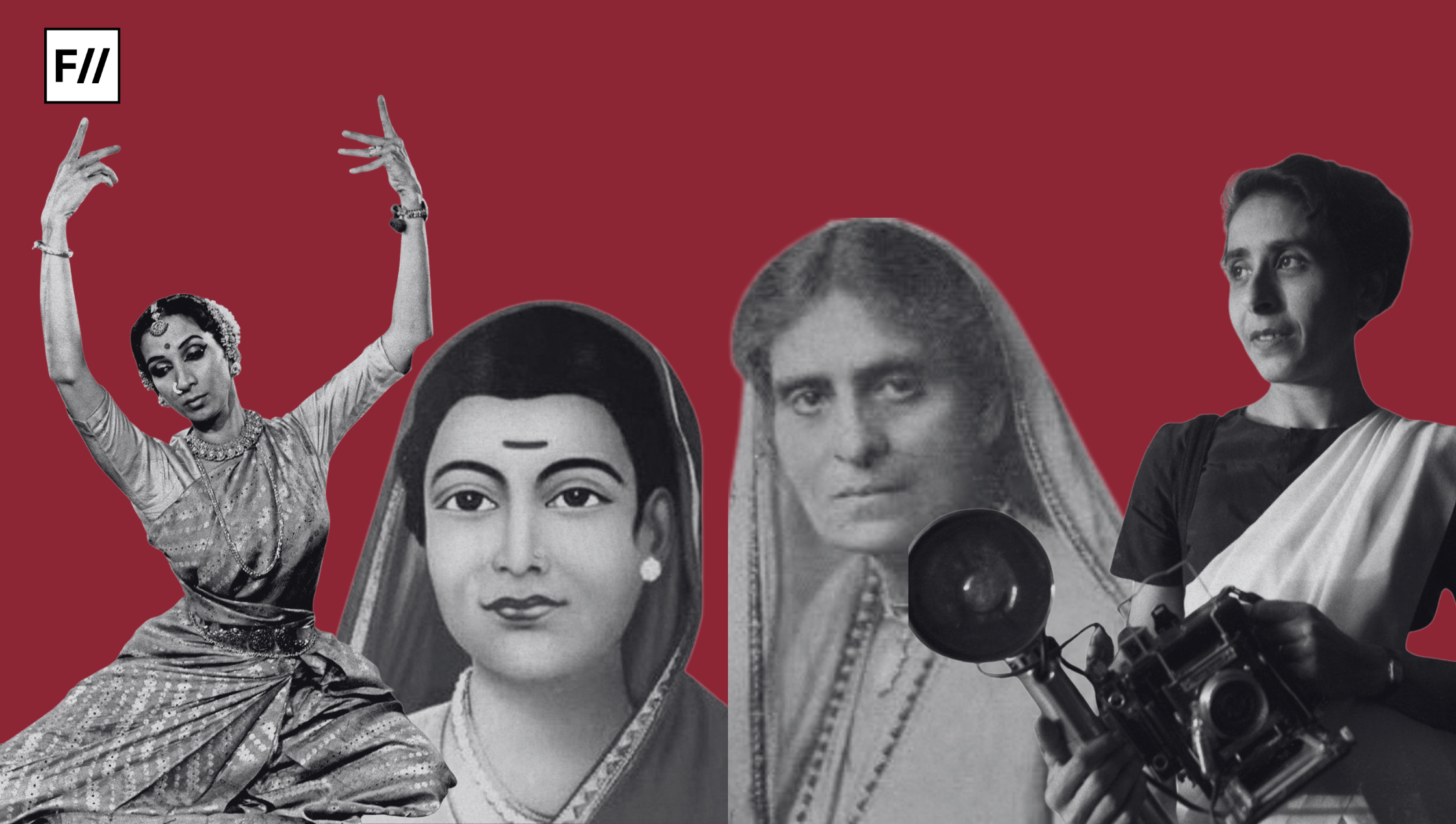Rashsundari Devi is among the earliest woman writers in Bengali literature. Her autobiography Amar Jiban (My Life) is known as the first published autobiography in Bengali language.
Rashsundari Devi lived in times when social reform had barely touched the lives of upper class/caste women in India. Education was unimaginable for women and a literate woman was synonymous with a wicked/cursed woman. But Rashsundari refused to remain an unlettered woman all her life. She taught herself to read and write, and constructed for herself an identity independent of her husband and children. She not only earned literacy by sheer dedication and hard work, but also used it for self-discovery.
Rashsundari taught herself to read at the age of twenty-six.
The most authentic source to know about Rashsundari Devi’s life is her own autobiography in which she has recorded all the major events of her life.
Birth and Life
Rashsundari Devi was born to a rural zamindari family in the small village of Potajia in Pabna (western Bangladesh) in 1809/1810. She lost her father Padmalochan Roy when she was only a small child. She was raised by her widowed mother with whom she developed a deep emotional attachment for life. Her mother was a very religious woman who taught her to remember God in good and bad times. Rashsundari’s writing is full of references to her mother and to God, both functioning as her significant other in structuring her thoughts and actions.
Rashsundari never received a formal education – educating girls was considered a sacrilegious act in her days. However, as a child, she would sit with the young boys in the outer room of her parents’ house where a missionary woman came to teach. She would listen to the boys repeating alphabets written on the board and try to learn. Unfortunately, the school was soon burned down bringing an end to whatever little access she had to literacy. Rashsundari’s later encounter with the written word proved that she had quite a good memory as she was able to recognize many of the alphabets she had learned back in childhood.
Rashsundari was married at the age of twelve to a man named Nilmani Roy who belonged to a well-to-do landed household in Rajbari, Faridpur. The marriage took her to the far off village of Ramdia where, as she mentions in her autobiography, people were kind and caring enough. Still the grief of separation from her beloved mother and that too at such a tender age was too much to overcome, and she would cry all the time. A Vaishnavite like her husband and his family, Rashsundari was deeply religious. Her firm faith in God’s grace along with her unbreakable spirit helped her carry on in all the challenging times.
Rashsundari would perform her domestic duties, but felt a strange desire for something she knew was forbidden to her. The desire to gain literacy!
At the age of fourteen, Rashsundari Devi faced no choice but to assume responsibility of the entire household as her mother-in-law had lost her eye-sight and become bedridden. She now had to do all the housework from cleaning to cooking to attending to guests and looking after everyone’s comfort. The family was a large one. There were servants but they were not allowed to enter the inner premises of the house. Her workload increased as she became a mother at the age of eighteen. She bore 12 children, of whom 7 died early. Unassisted and confined to the antahpur of the house, Rashsundari kept performing her domestic duties, but felt a strange desire for something she knew was forbidden to her. The desire to gain literacy! The desire to be able to read Chaintanya Bhagavata on her own.
One day, her husband left his Chaintanya Bhagavata in the kitchen before going out. Rashsundari gathered courage, detached a sheet from the book and hid it in the khori of the kitchen. Then she stole one of the palm leaves on which her son practiced handwriting. By comparing the words written on the two sheets and with people’s speech, by recollection and recognition of the letters she had learned in childhood, by constant effort and determination, Rashsundari taught herself to read at the age of twenty-six. She learned to write years later when her son expressed his annoyance about her not answering his letters.
Rashsundari was widowed at the age of 59 and a few months after her husband’s death, she finished and published the first version of her autobiography Amar Jiban in 1868. A final version was published in 1897.

Amar Jiban (My Life)
Amar Jiban was written and published in two parts. The first consisted of sixteen rachanas or compositions. The second part came out in the year 1906, consisting of fifteen rachanas or compositions. Every composition is preceded by a devotional poem dedicated to her Dayamadhav, the Vaishnav godhead whom Rashsundari Devi had chosen.
Written in chaste Bangla, Amar Jiban narrates the life story of a nineteenth century woman’s struggle for literacy. It portrays the changing world of rural Bengal and situates women there. About the title of the book, Tanika Sarkar writes:
“The book calls itself – with a thundering audacity – My Life. It makes a bold and a bald statement, presumptuous in the extreme, in a woman householder. A woman, moreover, who is not connected to a figure of religious or temporal significance, who cannot claim any miraculous powers or capacities. The life of such a woman would not be written – far less read – before the 19th century.” (Sarkar, 1999)
Rashsundari has narrated her life story in two ways. On one hand, she writes that God’s mercy and benevolence towards her has made it possible for her to achieve literacy. On the other hand, she also shows how she has made her own decisions in life by learning to read despite the fear of family disapproval and social ostracism. She praises God’s leela, but also recounts all the hard work and self-determination she has put in to learn reading.
Scholars like Tanika Sarkar and Meenakshi Malhotra have observed that Rashsundari Devi creates the persona of a “bhakt” (devotee) for herself, and presents all the small and big events of her life as exemplars of God’s mercy or leela, including her access to the written word. Thus her transgressive act of learning to read becomes an instance of godly intervention, a divine purpose, a consequence of God’s will and mercy. That is why, in the text, “the prayers tend to occur before she narrates some departure she makes from given norms, so as to take away the sting from her transgression.” (Sarkar, 1999)
Rashsundari Devi has written Amar Jiban in retrospection. The struggle to learn to read is being described when she has already mastered the art of writing. She describes the past in terms of vivid immediacy of feelings; she ignores dates, time, and other factual details, and focuses on descriptions of her everyday household life. And yet sentimentality is not something Rashsundari would indulge in while writing. Amar Jiban is written in a dispassionate, objective style. The prose is well-connected, coherent and polished.
Tanika Sarkar observes that “her (Rashsundari’s) writing is quite removed from the everyday, colloquial forms – not only in the syntax and in grammatical constructions, but also in the very nature of the prose that she uses. It is not, in any noticeable way, gender marked.” (Sarkar, 1999)
Rashsundari Devi: An Early Feminist
Rashsundari Devi’s life is a series of actions and decisions that are serious departures from the patriarchal social norms of her time and are, therefore, ‘transgressions’ punishable by the society.
Rashsundari Devi learned to read and write amidst the popular belief in those days that women who gained literacy brought disaster upon their families and were punished by God with widowhood. Not only did she learn to read, but she also decided to record the events and details of her everyday domestic life in a book and got it published. She had the audacity to disclose her life in print. By doing this, she entered the public sphere which was strictly forbidden to upper class Hindu women. A published work no longer remains a private act of writing but enters the public domain where it is open and available for perusal and interrogation by anyone. So there are three major “transgressions” that Rashsundari Devi commits according to patriarchy: reading, writing, and entering the public sphere.
By disclosing her life in print, she entered the public sphere which was strictly forbidden to upper-class Hindu women.
Rashsundari also made a notable departure from the common patriarchal belief that female worship can only be expressed in the form of rituals like vrats (fasts), penance, and cooking bhoga (food for god). Rashsundari rejected these conventional, ritualistic forms of woman’s devotion that served in maintaining the patriarchal social structures, and established an intellectual relationship with her God by learning to read Chaitanya Bhagavata. (Malhotra, 2016) She chose to engage in a kind of worship where she is an active participant (like her husband and other men), not a passive devotee.
Many Bengali male authors and poets who came after Rashsundari Devi wrote about the greatness of a housewife by positing her as ‘grihalakshmi’ or the domesticated goddess. Patriarchy has always presented the figure of a grihalakshmi as an ideal woman whose salvation and satisfaction lay in her endless servitude, and whose happiness lies in the happiness of her husband (master) and children. Rashsundari Devi, in her writing, demystifies the figure of the grihalakshmi by presenting her domestic duties as labour which is tiresome, repetitive, unrecognised, and far from emotionally fulfilling. Her assertion that “I did everything in a spirit of duty” is indicative of her emotional detachment from the household work. “Instead of viewing labour in an aesthetic and romanticized way as male writers like Tagore tended to do, Rashsundari deconstructs the iconic figure of the housewife in Amar Jiban.” (Malhotra, 2016) She also demythifies the nurturing maternal figure by describing her work of feeding and looking after children as physically laborious. In this manner, Rashsundari’s lifewriting contests the male representation of women in literature.
Rashsundari Devi’s lifewriting is a testimony of the odds against education of women of her generation. After describing all the steps she took to gain literacy including the stealing of sheets and palm leaves, she writes: “Wasn’t it a matter to be regretted, that I had to go through all this humiliation just because I was a woman? Shut up like a thief, even trying to learn was considered an offence. It is such a pleasure to see the women today enjoying so much freedom. These days parents of single girl child take so much care to educate her. But we had to struggle so much just for that.”
In the words of Debarati Sen,“Child marriage and the deep scar that it left on its young victims had probably never had a better spokesperson than Rashsundari. She exposes the shallow motives behind this evil practice which were the fear of female sexuality and the anxiety to control it.”
Rashsundari describes her child marriage and the agony of separation from her mother thus:
“If I am asked to describe my state of mind, I would say it was very much like the sacrificial goat being dragged to the altar, the same hopeless situation, the same agonized screams.” She adds, “People put birds in cages for their own amusement. Well, I was like a caged bird. And I would have to remain in this cage for life. I would never be freed.” In fact, the metaphor of a bird being caged is quite dominant in Rashsundari’s autobiography. She saw herself as a prisoner of marriage from where she wished to break free and transcend her worldly duties as a wife, mother, and daughter-in-law to meet her God.
Rashsundari Devi has described her experiences of pregnancy and childbirth in a very detailed and frank manner at a time when they were considered taboo topics for women to speak. Writing about her pregnancy and sharing it with the public by publishing is certainly a very feminist thing to do. Moreover, “she recalls with great wonder how her body flowered and bore fruits through divine intervention; which could be also a veiled reference to her satisfied sex life.” (Debarati Sen)
Rashsundari Devi, while writing about the hardships she had to face as a child bride and the risks she had to take to gain literacy, rejoices in the fact that the times are changing and some parents have started educating their daughters. Rashsundari Devi is definitely an advocate of women’s right to education, though she doesn’t mention it explicitly in her autobiography. Rashsundari Devi’s life story is an inspiration and a testimony of a woman’s will power to fight all odds in order to gain education and liberation.
References
- ‘The Bangladesh Reader: History, Culture and Politics.’ Edited by Guhathakurta Meghna, Schendel Willem. Duke University Press. 2013. Pg: 83-87
- ‘Women Writing in India: 600 B.C. to the Early Twentieth Century.’
Edited by Susie J. Tharu, Ke Lalit. Preview here. - Sen Debarati. ‘Rassundari Debi: Excerpts from Amar Jiban Author.’ Published by University of Delhi.
- Sarkar, Tanika. ‘A Book of Her Own. A Life of Her Own: Autobiography of a Nineteenth-century Woman’. History Workshop Journal, 36. 1993.
- ‘Representing Self, Critiquing Society: Selected Lifewritings by Women.’ Edited by Meenakshi Malhotra. Worldview Critical Editions. 2016
- Sarkar, Tanika. ‘Words to Win: The Making of a Modern Autobiography.’ New Delhi: Kali for Women, 1992
About the author(s)
Hira is a part-time researcher-writer and full-time existentialist. She passionately consumes philosophy, literature and cinema. Her areas of interest include World Literature, Sexuality Studies, Women's Writing and Post-colonial Studies.




